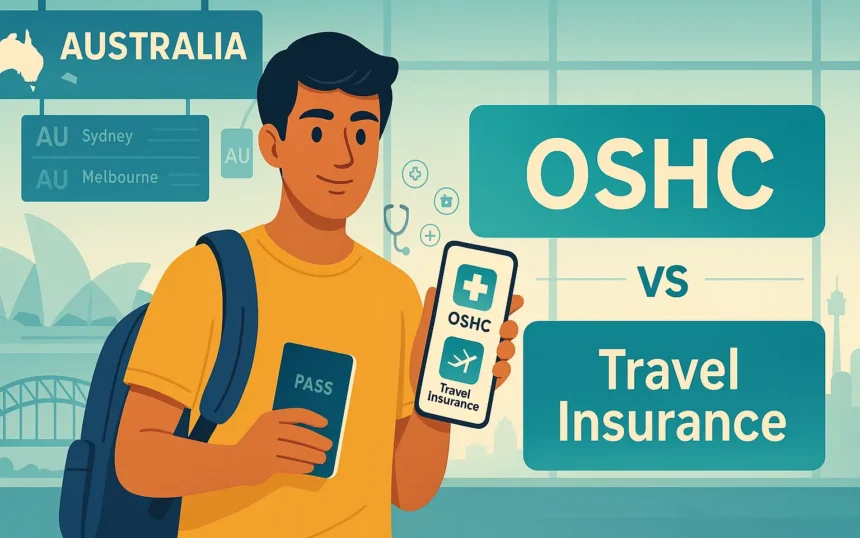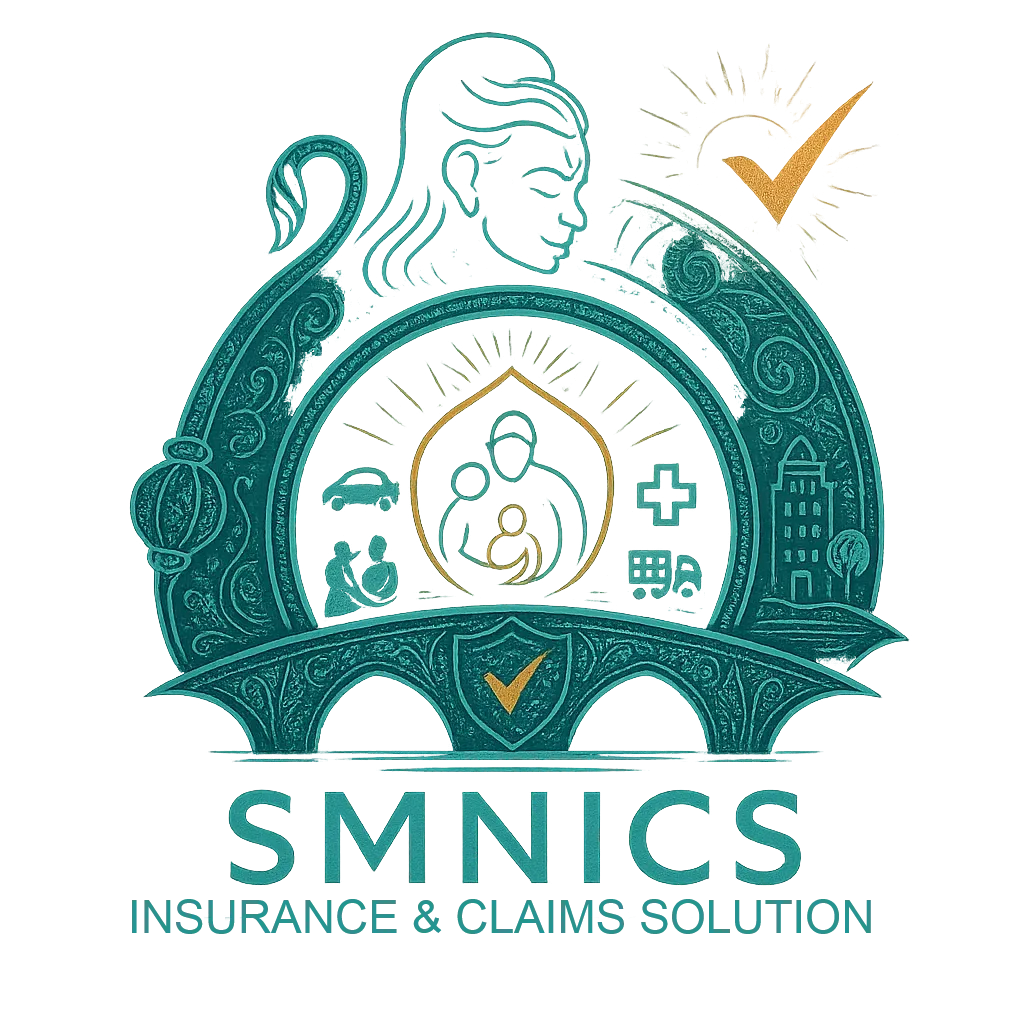
Visa safety net plus trip safety net. Know the difference, buy smart, travel lighter.
You have your offer letter. You are building checklists, chasing bank papers, and saying slow goodbyes. There is also a quiet worry in the corner. Health care in Australia is expensive. Flights and bags are expensive too. What if something goes wrong before you even land.
Here is the simple truth. OSHC vs travel insurance is not a fight. You need both for different reasons. OSHC keeps you steady with health care in Australia. Travel insurance protects your journey, your luggage, your bookings, and some extras that OSHC does not touch. Put them together and you can focus on your studies instead of bills.
What is OSHC in plain words
Overseas Student Health Cover is a health insurance policy you must hold to get and keep an Australian student visa. Think of it as your medical safety net while you live in Australia. It helps pay for treatment when you fall sick or get hurt. It reduces the shock of hospital or clinic bills.
What most basic OSHC plans usually include:
- Hospital treatment for approved services, with stays in a public hospital shared ward when required.
- Visits to a general practitioner when you are unwell.
- Emergency ambulance transport to a hospital.
- Part payment for prescription medicines with annual and per‑script limits.
- In some policies, limited access to private day surgery or private hospitals.
What standard OSHC usually does not include:
- Physiotherapy, chiropractic visits, acupuncture, and similar services unless you buy extra cover.
- Dental care like cleaning, fillings, or a root canal unless you have a separate policy.
- Optical costs like glasses, lenses, or routine eye tests unless you add cover.
OSHC is designed for medical needs inside Australia. It does not help with travel delays, lost baggage, visa rebooking costs, or documents lost in transit. That is where a student travel policy comes in.
What travel insurance does that OSHC does not
Travel insurance is the trip safety net. It starts working before you fly and keeps working during your journey and early settling period. Here are the big gaps it fills.
- Trip cancellation and interruption. If sickness, injury, or a covered emergency stops you from flying or forces you to return early, travel insurance can refund non‑refundable tickets and bookings.
- Baggage loss, theft, and delay. If your bag disappears in transit or shows up a day late, the policy helps replace essentials. If your laptop or phone is stolen, you can claim within the sub‑limits.
- Travel delays and missed connections. When one late flight breaks the rest of the route, the policy can cover meals, hotel nights, and rebooking costs.
- Documents support. Extra costs if a passport goes missing before boarding or during a stopover.
- Emergency dental or optical. Some student travel plans include limited benefits for urgent tooth or eye issues that OSHC does not cover.
- Pre‑existing conditions options. If you have a known condition, select plans can offer limited cover for sudden flare‑ups, subject to declarations and terms.
You can hold both. OSHC for medical care in Australia. Travel insurance for the journey and all the non‑medical mess that comes with travel.
A simple way to remember the split
- OSHC equals health care inside Australia while you study. GP visits, hospital stays, emergency ambulance, some medicines.
- Travel insurance equals your journey and logistics. Cancellations, delays, baggage issues, and some emergency extras.
Two nets. Two jobs. Together they turn a crisis into steps you can follow.
How to choose like a student on a budget
Price matters. So does peace of mind. Use this approach to keep both.
1) Lock OSHC first
Choose an approved OSHC period that covers your entire visa stay. Confirm start date, end date, and provider service access near your campus. Read how prescriptions are reimbursed and what your out‑of‑pocket amounts are.
2) Add travel insurance for the journey window
Start cover from the day you would lose real money if plans change. End it a week or two after arrival so luggage and transit issues are still covered while you settle in and buy local SIMs.
3) Match limits to real risk
- Add up non‑refundable booking costs. Select a trip cancellation limit that actually covers these numbers.
- Carrying a laptop and phone. Check gadget sub‑limits. If the base cap is tiny, buy an add‑on.
- If you have a condition like asthma or diabetes, look for pre‑existing coverage options in travel insurance for the journey period and confirm OSHC rules for ongoing care in Australia.
4) Prefer simple help
A 24×7 helpline, a clean app to upload documents, and clear wording save time when you are stressed. If support cannot explain a clause in plain words, skip that provider.
5) Keep documents in two places
Save PDFs and hotline numbers on your phone and email. Print one copy for your cabin bag. Share the policy details with a parent or trusted friend.
If something goes wrong, what to do
Trip cancelled before departure
See a doctor if you are unwell and ask for a note that says you are unfit to travel. Inform the travel insurer as soon as possible. Share ticket invoices and hotel bookings. Follow their checklist to claim cancellation costs. Your OSHC will not apply yet because you are not in Australia.
Baggage delayed or missing
At the airport, file a Property Irregularity Report with the airline before you leave the terminal. Keep boarding passes and bag tags. Buy basic clothes and toiletries if allowed by your plan. Save all receipts. Inform the travel insurer quickly.
Medical issue after you arrive
For routine issues, book a GP near campus. Show your OSHC details. For emergencies, call the local emergency number and your OSHC helpline. Keep bills, prescriptions, and discharge summaries. If a service is not covered by OSHC, ask about costs up front.
Passport lost in transit
Inform airport and local police, contact your country’s mission, and call the travel insurer for guidance on extra travel costs. Keep every document copy they ask for.
Dental pain or broken glasses
Check your travel policy first for any emergency benefit during the journey window. For ongoing needs in Australia, OSHC usually does not cover these, so plan a private add‑on if you require frequent care.
OSHC vs travel insurance: side by side in words
Purpose
OSHC pays for approved medical treatment in Australia while you study. Travel insurance protects your journey money and your belongings and offers some emergency extras.
When it works
OSHC works after you enter Australia and until your cover end date. Travel insurance works from the purchase start date and covers you before boarding, during flights and stopovers, and for a short period after arrival if you set it that way.
What it will not do
OSHC will not pay for trip cancellations, baggage issues, passport problems, or airline delays. Travel insurance will not pay for routine doctor visits in Australia after you settle unless the policy specifically says so.
Extras
OSHC may offer limited private hospital access depending on your plan. Travel insurance may offer small benefits for emergency dental, optical, or physiotherapy during the trip window.
Common mistakes students make
- Buying OSHC late and then rushing the start date paperwork.
- Assuming OSHC covers the journey to Australia and then losing money when plans change.
- Ignoring gadget sub‑limits and finding the laptop is covered only for a small amount.
- Not reading the conditions for pre‑existing conditions. Silence creates disputes later.
- Forgetting to save hotline numbers and policy PDFs in two places.
Fix is simple. Read your documents once with a pen in hand. Circle what you do not understand and ask support to explain in simple words. Clear now means calm later.
Plain English glossary you can screenshot
OSHC. A health insurance policy for international students that helps pay for medical care while you live in Australia and is part of the visa requirement.
Student travel insurance. A policy that protects your trip money and belongings from the time you book until you settle, and can include some emergency extras.
Excess or deductible. The small amount you pay first before the insurer pays the rest.
Pre‑existing condition. A health issue you already had before buying a policy. Some policies cover emergency flare‑ups if you declare them and pay extra.
Trip cancellation. Money back for non‑refundable bookings when a covered event stops you from travelling.
Trip interruption. Money back for the unused part of your trip when you need to return early for a covered reason.
Your next step
Buy OSHC to meet your visa and to reduce medical stress in Australia. Add travel insurance to protect your bookings and your bags. Save both policies and hotlines where you can find them in two taps. Share them with someone you trust. Small habits keep you safe when life turns messy.
FAQs
Yes. OSHC (Overseas Student Health Cover) is required to get and keep your Australia student visa. It pays for approved medical treatment while you live in Australia.
OSHC = health care in Australia (GP visits, hospital, ambulance, some medicines). Travel insurance = the journey and logistics (trip cancellation, delays, baggage loss, stolen devices, passport issues) plus some emergency extras.
Yes. OSHC does not cover trip cancellation, missed connections, or baggage problems. Student travel insurance protects you before boarding, during flights/stopovers, and right after arrival.
Not in standard plans. Dental check‑ups, fillings, glasses, lenses, and physio are usually excluded unless you add private extras. Some student travel policies include limited emergency dental/optical during the trip window.
OSHC rules vary; ongoing care in Australia may have waiting periods and limits. Many travel policies exclude pre‑existing conditions unless you declare them and buy a waiver or a plan that allows emergency flare‑up cover.
Buy OSHC for your full visa period (start to end). Buy travel insurance from the date you could lose money (tickets/hotels) until a week or two after arrival, so baggage and transit issues are covered while you settle in.
No. OSHC works inside Australia. For pre‑departure illness, flight cancellation, or baggage loss in transit, you need travel insurance.
Often no for visa refusal; some policies may offer limited benefits with conditions. Course deferral is usually excluded unless linked to a covered event. Always check the policy’s cancellation reasons list.
Most OSHC plans do include emergency ambulance transport to hospital inside Australia. Check your provider’s wording for limits and co‑payments.
Yes. Choose student travel insurance that covers multi‑country transit and stopovers between India and Australia for your full journey dates.
File a Property Irregularity Report (PIR) with the airline before leaving the airport. Keep tags/boarding passes, buy essentials within limits, and inform your travel insurer quickly. OSHC does not apply here.
Usually yes. Ensure continuous cover for your whole visa period and follow provider/visa rules when switching. Do not leave any gap.
Policy PDFs, hotline numbers, booking invoices, medical notes, airline PIR, receipts for essentials, and ID pages. Save to phone + email; keep one printed copy in your cabin bag.
OSHC for full visa dates (medical net in Australia)
Travel insurance with trip cancellation & interruption that matches your non‑refundable spend
Baggage & gadget limits that fit your laptop/phone
Emergency medical evacuation on the travel policy for the journey window
Written by a SMNICS advisor who has helped Indian students and families compare student cover and travel plans with clear, no pressure guidance.


